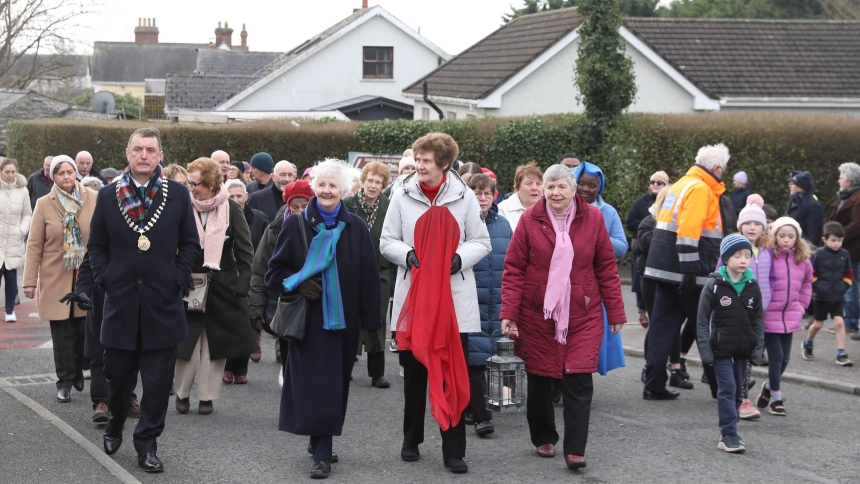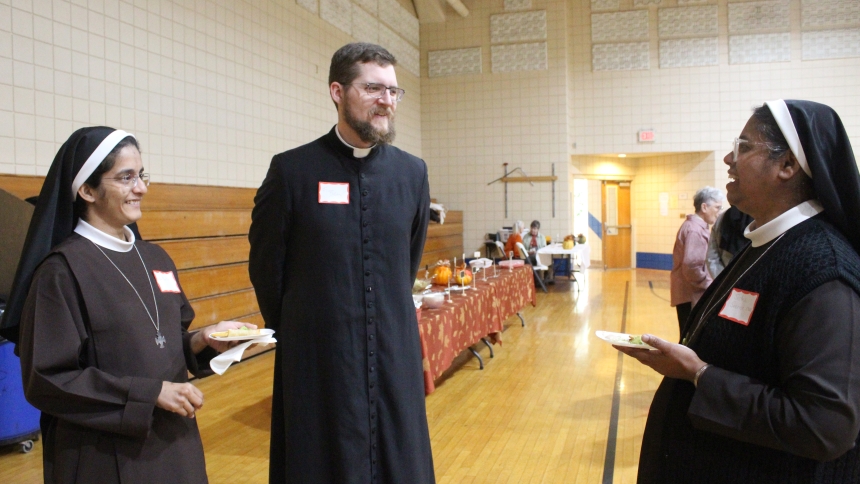
DUBLIN (OSV News) - An Irish bishop encouraged people to continue to show goodwill toward asylum-seekers against a backdrop of growing protests about immigration in the country.
Bishop Denis Nulty of Kildare and Leighlin said the celebration of St. Brigid's Day Feb. 1 is a moment to reflect on the saint's message of hospitality.
He spoke Jan. 28 as a relic of one of Ireland's patron saints was returned to her hometown after a millennium and as the country prepares to mark 1,500 years since the death of St. Brigid.
It will be the second time in Irish history that the feast day will be commemorated by a recently established public holiday.
In his homily, Bishop Nulty said he hoped the relic would inspire the faithful to follow Brigid's example.
"It's too simple to install a relic and leave it at that, she would call us to do much more! What were the character traits that defined St. Brigid of Kildare?" the bishop asked.
"To mention just a few, she was hospitable, she was a peacemaker, she was a strong woman of faith."
Referring to recent protests at asylum centers and a spate of arson attacks on proposed sites, Bishop Nulty lamented the fact that Ireland has a tradition of welcoming people, but "not always if you are fleeing persecution, war or trauma.
"The scenes on some of our streets and the misinformation that passes unverified on social media disturb, because this is not the hospitality that Brigid espoused.
"This is much more important than installing a relic, inculcating values that are championed by Brigid," the bishop insisted.
Hundreds of people gathered from early morning in Kildare in the Irish midlands for Mass to mark the occasion celebrated by Bishop Nulty.
According to tradition Brigid, born around 450 in Dundalk, County Louth, Ireland, an abbess renowned for miraculous deeds, was buried at her monastery in Kildare, which quickly became a site of pilgrimage and veneration.
However, around 300 years later, when the Vikings were raiding Ireland, her remains were moved to Downpatrick in present-day Northern Ireland, and buried alongside Ireland's other two patron saints, St. Patrick and St. Colmcille.
Some 400 years later, at the time of the Reformation, St Brigid's remains were taken to Portugal to be preserved from King Henry VIII's forces who were destroying religious sites which refused to accept the new Protestant religion.
Today, Brigid's relics are still venerated in the Church of St. John the Baptist in Lumiar, Portugal. Local Brigidine Sisters - named after the saint - managed to bring a fragment of Brigid's remains to Ireland in the 1930s for private devotion. Now, to mark 1,500 years since her death, that fragment has been enclosed in a special reliquary and moved to St. Brigid's parish church for veneration of the faithful.
Speaking after the Mass, Brigidine Sister Rita Minahen said the homecoming was a special day for the entire community.
"It's very meaningful because we wouldn't have a Kildare without her -- Kildare owes its existence to St. Brigid. … The town grew up around the monastery and the hinterland and so she's very special, she's synonymous with Kildare," she told reporters at the ceremony.
David Mongey, chairman of the Kildare Tourism Board, described the ceremony as a "very momentous occasion."
"It's a homecoming of St. Brigid's relics after 1,000 years or more - she's finally coming home to rest in her native town in Kildare," he said in a statement.
Meanwhile, St Brigid's feast day - Feb. 1 - will be marked in Kildare by an ecumenical service to be held in the Anglican cathedral named after the saint.
The service will be led by Bishop Nulty and his Anglican counterpart, Bishop Pat Storey.
Following the service, participants will observe a "pause for peace" which they are asking people of goodwill around the globe to join them in.
Caption: Theresa Kilmurray of the Brigidine Congregational Leadership Team carries the St. Brigid relic, draped in red, to St. Brigid's Church in Kildare, Ireland, Jan. 28, 2024. (OSV News photo/courtesy John Mc Elroy)



